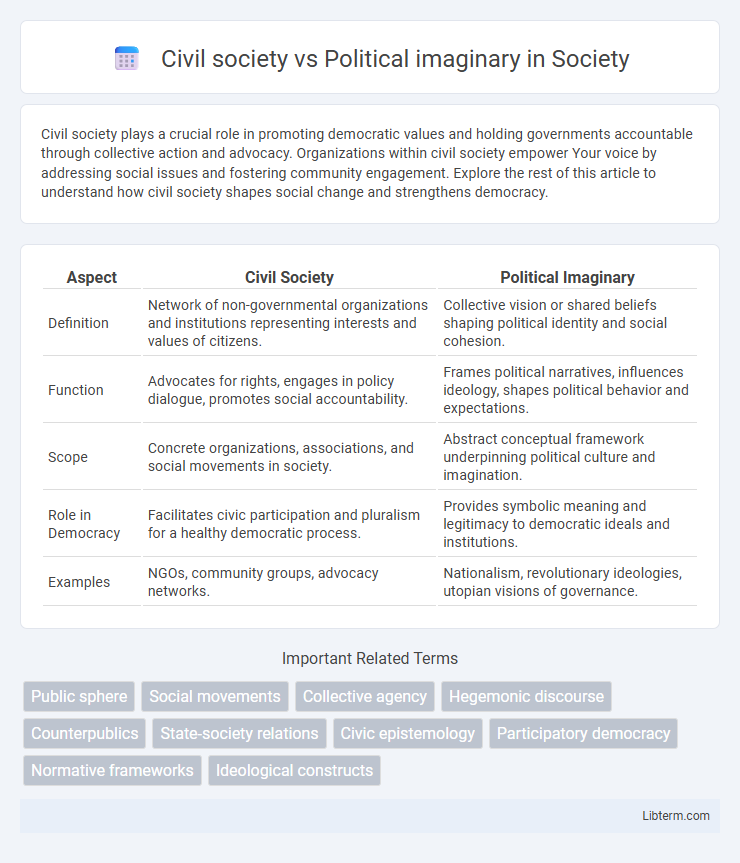Civil society plays a crucial role in promoting democratic values and holding governments accountable through collective action and advocacy. Organizations within civil society empower Your voice by addressing social issues and fostering community engagement. Explore the rest of this article to understand how civil society shapes social change and strengthens democracy.
Table of Comparison
| Aspect | Civil Society | Political Imaginary |
|---|---|---|
| Definition | Network of non-governmental organizations and institutions representing interests and values of citizens. | Collective vision or shared beliefs shaping political identity and social cohesion. |
| Function | Advocates for rights, engages in policy dialogue, promotes social accountability. | Frames political narratives, influences ideology, shapes political behavior and expectations. |
| Scope | Concrete organizations, associations, and social movements in society. | Abstract conceptual framework underpinning political culture and imagination. |
| Role in Democracy | Facilitates civic participation and pluralism for a healthy democratic process. | Provides symbolic meaning and legitimacy to democratic ideals and institutions. |
| Examples | NGOs, community groups, advocacy networks. | Nationalism, revolutionary ideologies, utopian visions of governance. |
Defining Civil Society: Concepts and Evolution
Civil society encompasses the network of organizations, institutions, and relationships that operate independently from the government and market, facilitating citizen participation and collective action. Its evolution reflects diverse conceptualizations, ranging from Tocqueville's emphasis on voluntary associations to Gramsci's view linking civil society with ideological hegemony. Understanding civil society involves analyzing its role in promoting social capital, public deliberation, and democratic governance beyond formal political institutions.
Understanding Political Imaginary: Meaning and Origins
Political imaginary refers to the collective framework of symbols, narratives, and values through which societies interpret political life, shaping citizens' perceptions of governance and power. Its origins trace back to cultural myths, historical experiences, and social practices that embed shared meanings within a community, influencing political behavior and expectations. Unlike civil society, which involves organized groups and institutions, political imaginary operates at the symbolic level, constructing the ideological backdrop against which political actions and identities are understood.
Historical Intersections of Civil Society and Political Imaginary
Historical intersections of civil society and political imaginary reveal how collective identities and shared visions shape social movements and governance frameworks. Civil society's institutions, such as NGOs and grassroots organizations, often embody political imaginaries that envision alternative power structures and social orders. These interactions have driven transformative political changes by embedding new norms and values within public consciousness and institutional practices.
The Role of Ideology in Shaping Political Imaginaries
Ideology plays a crucial role in shaping political imaginaries by providing a framework through which individuals and groups interpret their social and political realities. Civil society is often influenced by dominant ideological narratives that construct collective identities, drive political engagement, and define the possibilities of social change. These ideological constructs impact the formation of political imaginaries by framing both the vision of society and the pathways for political action within it.
Civil Society as a Site of Social Innovation
Civil society functions as a dynamic site of social innovation where grassroots organizations, community groups, and non-governmental entities collaboratively address societal challenges beyond state mechanisms. This ecosystem fosters novel approaches in areas like environmental sustainability, social justice, and civic engagement, reshaping social norms through participatory practices and collective action. Unlike the political imaginary rooted in symbolic and ideological frameworks, civil society enacts tangible, pragmatic interventions that drive inclusive social transformation.
Power Dynamics: Civil Society’s Influence on Political Space
Civil society shapes political spaces by mobilizing collective action and influencing power structures through advocacy, grassroots movements, and public discourse. Its engagement challenges traditional political imaginaries by redefining authority and legitimacy beyond state institutions. Empowered civil society actors leverage networks and resources to negotiate and contest power dynamics within governance frameworks.
The Tension Between Collective Action and Political Fantasy
Civil society encompasses organized groups and institutions mobilizing for shared interests, grounded in tangible collective action and social accountability. The political imaginary reflects collective hopes and myths shaping visions of ideal governance, often existing as a symbolic framework detached from immediate pragmatic efforts. The tension arises when civil society's concrete strategies confront political fantasies, challenging the balance between achievable social change and aspirational political ideals.
Case Studies: Real-world Manifestations of Political Imaginaries
Case studies of political imaginaries reveal how civil society shapes collective visions of governance and social order, as seen in the Arab Spring where grassroots movements redefined political possibilities. The Zapatista uprising in Mexico exemplifies a political imaginary rooted in indigenous autonomy that challenges state-centric models through sustained civil society activism. Similarly, Occupy Wall Street encapsulates a decentralized political imaginary contesting economic inequality, mobilizing civil society around alternative democratic practices and social justice demands.
Challenges Facing Civil Society in Modern Political Contexts
Civil society faces significant challenges in modern political contexts, including restrictions on freedom of assembly and expression, increasing governmental surveillance, and the rising influence of populist and authoritarian regimes that undermine civic engagement. Fragmentation within civil society organizations and the spread of misinformation further weaken their capacity to mobilize and advocate effectively. Sustained pressure from political institutions and limited access to resources constrains their role in fostering democratic participation and holding power accountable.
The Future of Civil Society and Political Imaginary in Democratic Development
The future of civil society in democratic development hinges on its ability to foster grassroots participation and hold political institutions accountable, embedding diverse voices in governance. Political imaginaries shape the collective vision of democracy, influencing public expectations and policy priorities that evolve with social dynamics and technological advancements. Strengthening civil society networks alongside inclusive, adaptive political imaginaries can drive resilient democratic reforms and sustainable civic engagement.
Civil society Infographic

 libterm.com
libterm.com